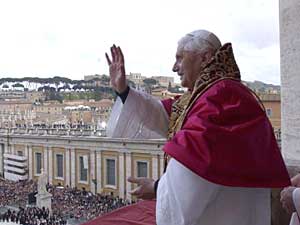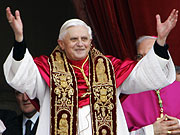Photos
| ||||||||||||||||||||||
April 19, 2005
 |
| Cardinal Joseph Ratzinger, chosen Pope Benedict XVI Tuesday, is considered a hard-line conservative. Others say his personal touch is not often acknowledged. (Photo by Arturo Mari-Pool/Getty Images) |
Vatican City — (AP) - A man of deep personal faith who choked up as he delivered the homily at Pope John Paul II's funeral, Cardinal Joseph Ratzinger also has alienated some Roman Catholics with his zeal in enforcing church orthodoxy.
And on those issues, the new Pope Benedict XVI is immovable.
Even as the cardinals who elected him prayed before the conclave, Ratzinger urged them to cling to church tradition and warned about the dangers of abandoning it.
"Having a clear faith, based on the creed of the church, is often labeled today as a fundamentalism," he said Monday.
"Whereas relativism, which is letting oneself be tossed and 'swept along by every wind of teaching,' looks like the only attitude acceptable to today's standards."
"We are moving toward a dictatorship of relativism which does not recognize anything as for certain and which has as its highest goal one's own ego and one's own desires," he warned.
They were words that would go over well in the conservative Alpine foothills of Bavaria where Ratzinger grew up and remains a favorite son. Now, at 78, he has become the 265th pope of the Catholic Church and the first Germanic pope since monarchs imposed four men from that region in a row in the 11th century.
"Only someone who knows tradition is able to shape the future," said the Rev. Thomas Frauenlob, who heads the seminary in Traunstein where Ratzinger studied and regularly returns to visit.
But opinion about him remains deeply divided in Germany, a sharp contrast to John Paul, who was revered in his native Poland. A recent poll for Der Spiegel news weekly said Germans opposed to Ratzinger becoming pope outnumbered supporters 36 percent to 29 percent, with 17 percent having no preference. The poll of 1,000 people, taken April 5-7, gave no margin of error.
Many blame Ratzinger for decrees from Rome barring Catholic priests from counseling pregnant teens on their options and blocking German Catholics from sharing communion with their Lutheran brethren at a joint gathering in 2003.
Ratzinger has clashed with prominent theologians at home, most notably the liberal Hans Kueng, who helped him get a teaching post at the University of Tuebingen in the 1960s. The cardinal later publicly criticized Kueng, whose license to teach theology was revoked by the Vatican in 1979.
He has also sparred openly in articles with fellow German Cardinal Walter Kasper, a moderate who has urged less centralized church governance and was considered a dark horse papal candidate.
"He has hurt many people and far overstepped his boundaries in Germany," said Christian Wiesner, spokesman for the pro-reform Wir Sind Kirche, or We Are Church movement.
Ratzinger may have softened his image - at least among his colleagues - with the delivery of the homily at John Paul II's funeral. Choking back tears, the cardinal said that "we can be sure our beloved pope is standing today at the window of the father's house, that he sees us and blesses us."
In his autobiography, Ratzinger said he sensed he was out of step with his fellow Germans as early as the 1960s, when he was a young assistant at the Second Vatican Council in Rome.
Returning to Germany between sessions, "I found the mood in the church and among theologians to be agitated," he wrote. "More and more there was the impression that nothing stood fast in the church, that everything was up for revision."
Ratzinger left Tuebingen during student protests in the late 1960s and moved to the more conservative University of Regensburg in his home state of Bavaria.
Catholics and Protestants each account for about 34 percent of the German population, but Bavaria is one of the more heavily Catholic areas.
"What Wadowice was for John Paul, Bavaria is for Ratzinger," said Frauenlob, referring to John Paul II's hometown in southern Poland. "He has very deep roots here, it's his home."
The cardinal was born in Marktl Am Inn, but his father, a policeman, moved frequently and the family left when he was 2.
He and his older brother, Georg - former director of the renowned Regensburger Domspatzen boys choir - return annually to the peaceful halls of St. Michael's Seminary to stay in the elegant, but sparsely furnished bishop's apartment next to the church.
An accomplished pianist who loves Mozart, Ratzinger enjoys playing the grand piano in the seminary's main hall, and walking through downtown Traunstein greeting people, Frauenlob said.
Traunstein was also where Ratzinger went through the harrowing years of Nazi rule and World War II.
In his memoirs, Ratzinger wrote that he was enrolled in the Nazi youth movement against his will when he was 14 in 1941, when membership was compulsory. He said he was soon let out because of his studies for the priesthood.
Two years later he was drafted into a Nazi anti-aircraft unit as a helper, a common task for teenage boys too young to be soldiers. A year later he was released, only to be sent to the Austrian-Hungarian border to construct tank barriers.
He deserted the German army in April 1945, in the final weeks of the war in Europe, and returned to Traunstein - a risky move, since deserters were shot on the spot if caught, or publicly hanged as examples to others.
When he arrived home, U.S. soldiers took him prisoner and held him in a POW camp for several weeks. Upon his release, he re-entered the seminary.
Ratzinger was ordained, along with his brother, in 1951. He then spent several years teaching theology. In 1977, he was appointed bishop of Munich and elevated to cardinal three months later by Pope Paul VI.
John Paul II named him leader of the Congregation for the Doctrine of the Faith in 1981, where he was responsible for enforcing Catholic orthodoxy and was one of the key men in the drive to shore up the faith of the world's Roman Catholics.
Ratzinger speaks several languages, among them Italian and English, as well as his native language German.
Frauenlob calls him a subtle thinker with a deep understanding of Catholic tradition and a personal touch he's not often given credit for.
He cites the example of the seminary's 2003 confirmation service where no bishop was available. Ratzinger swiftly agreed to come, confirming the 14 boys, then taking time to speak personally to each one after the ceremony.
"I find it hurtful to see him described as a hard-liner," Frauenlob said. "People are too quick to say that, it's not an accurate reflection of his personality."
(Copyright 2005 by The Associated Press. All Rights Reserved.)





